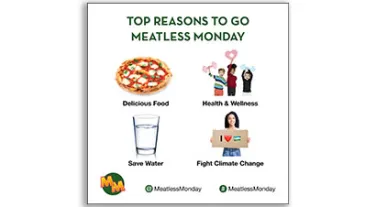
Program overview: Over 300 households in Bedford, New York, took the Bedford 2020 Meatless Monday challenge as part of a larger community 2020 Climate Action Plan. The Johns Hopkins Center for a Livable Future and Meatless Monday provided the Bedford 2020 program with science-based and promotional materials to raise awareness of meat production’s impact on the environment and personal health.
Objective: Use Meatless Monday to promote plant-based eating and reduce carbon emissions as part of a larger community sustainability initiative.
Process: Launch a 12-week informational grassroots campaign to encourage local restaurants, businesses, hospitals, places of worship, and school cafeterias to offer more plant-based menu options on Mondays and promote these businesses and institutions online and in print.
Outcome: When the 12-week campaign concluded, the Bedford community had reduced its collective carbon footprint by 25 tons (the equivalent of driving 56,000 fewer miles) and sustained a commitment to lower meat consumption. This behavior change coincided with significant increases in residents’ perceived abilities to prepare and order plant-based options. These increases were often attributed to elevated concerns over climate change, improved proficiencies as cooks, and changes to their local food environment.
When a community commits to change, it can achieve outstanding results in a short time. And that’s precisely what happened in Bedford, New York—a small town about 40 miles north of New York City—when a group of volunteers decided to use Meatless Monday as part of their broader Bedford 2020 environmental sustainability initiative. Bedford 2020 (renamed Bedford 2030) is a movement dedicated to addressing the urgent issue of climate change by reducing greenhouse gas emissions and preserving natural resources.
Meatless Monday, in collaboration with the Johns Hopkins Center for a Livable Future, provided Bedford 2020 members with a suite of resources, including social media assets, printable posters and flyers, and educational materials related to plant-based foods' environmental and health benefits. Additionally, Meatless Monday developed a community communications package that included recipes, tips, and a weekly newsletter sign-up.
Johns Hopkins Center for a Livable Future conducted several pre- and post-surveys to assess the number of households participating in the Meatless Monday challenge and evaluate any behavior change. A post-challenge survey showed that 74% of respondents said the Meatless Monday Challenge raised their understanding of how food choices affect climate.





